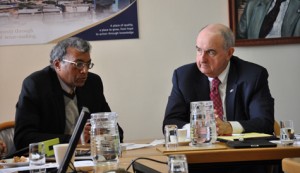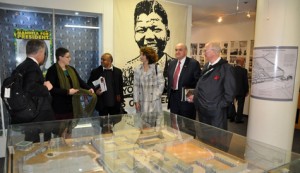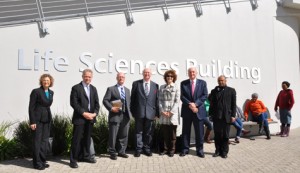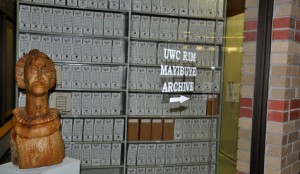Lessons of the past, promises of tomorrow
As members of the IU delegation met with senior leaders this morning at the University of the Western Cape—a public university located in the Belleville suburb of Cape Town, South Africa—it was next to impossible, at least from this observer’s vantage point, not to marvel at a most timely juxtaposition.
Just a few hours prior to the trip to UWC, President Barack Obama delivered remarks from the steps of the Lincoln Memorial commemorating the 50th anniversary of the historic March on Washington and the heroism of its leader, Dr. Martin Luther King Jr. In his address, Obama spoke about the spirit of the march and the sacrifices made by thousands of Americans, “men and women, young and old, blacks who longed for freedom and whites who could no longer accept freedom for themselves while witnessing the subjugation of others.”

IU President Michael A. McRobbie, right, and University of the Western Cape Deputy Vice Chancellor Ramesh Bharuthram discuss possible collaborations between their universities.
Three years before the March on Washington and halfway across the world, the South African government, seeking to racially segregate higher education under the system of apartheid, established the University of the Western Cape as a school for colored students only. (Its first group of 166 students were given limited training for lower- to mid-level positions in schools, the civil service and other institutions that would serve a separate colored community.) UWC would remain this way several decades, during which its leadership was primarily white.
As UWC continued to grow, so, too, did the campus’ intellectual and innovative spirit, much of which became focused on making the university freer and more democratic. By 1982, UWC’s leadership had formally rejected the apartheid ideology on which it was established, and a year later the university had gained autonomy on the same terms as established white institutions.
With the official abolishment of apartheid in 1994, UWC had made a major contribution to what Dr. King’s South African and spiritual counterpart, Nelson Mandela, and other political activists in the country had long fought and sacrificed—the creation of a new democratic order. What’s more, it had rapidly become one of the nation’s top research institutions and a major player in the formation of public policy and preparing South African students for a wide range of high-level careers.

The IU delegation looks at a model of Robben Island at the University of the Western Cape-Robben Island Mayibuye Archives. The archives contain many records that document the apartheid period, the freedom struggle and political imprisonment in South Africa.
Ironically, though, UWC had been so successful in bringing about change that when Mandela became president, in 1994, he took with him nearly a third of the university’s leadership team (including its president) to build his cabinet. Today, UWC’s current leadership, with whom members of the IU delegation met today, refers to the loss of that talent as “brain drain,” another interesting juxtaposition when one considers the term’s connotations as they apply to higher education in the U.S.
The draining of intellectual assets at UWC came at a critical time for the university, which, to this day, continues to deal with the tension of dealing with a country where poverty affects around 85 percent of the total population. But the university has responded quite well. Over the last two decades it has experienced an enormous amount of growth as it has strategically aligned its teaching, learning and research resources with South Africa’s greatest challenges.
At today’s meetings, the leadership of UWC, which now has an enrollment of more than 20,000 students, expressed an eagerness to continue to confront those challenges, while growing its own international relations with universities that have complementary missions and strengths. To this end, leaders from both IU and UWC agreed that they are academically well matched, most notably in such key areas as education, the life sciences and the arts and humanities, and that they would seek ways to further student and faculty exchanges between their respective institutions.
Particularly intriguing to IU President Michael McRobbie and Vice President for International Affairs David Zaret, who has served as interim dean of IU’s College of Arts and Sciences on two separate occasions, was UWC’s focus on renewing the humanities in South Africa. As UWC Deputy Dean and Director of the Center for Humanities Premesh Lalu passionately explained, UWC is eager to build partnerships in the area of creative activity, which, sadly, apartheid denied to most of South Africa’s population.
After the formal meeting ended, McRobbie, Zaret and other members of the IU delegation got a first-hand look at how UWC is recharging creative activity on campus and engaging students in important cultural, historical, political and social conversations that South Africans need to succeed in rising above some of the problems plaguing the country, most notably extreme poverty.
UWC’s Lalu led delegation members on a tour of UWC’s impressive collection of archival materials related to Robben Island, the island off the coast of Cape Town where Mandela and other anti-apartheid activists were imprisoned and where the IU contingent hopes to visit later this week, weather-permitting. The UWC-Robben Island Mayibuye Archives, through which the Robben Island Museum was launched, is the leading archive in South Africa with 100,000 photographs, 10,000 film recordings, 5,000 island artifacts, 2,000 oral history tapes and 2,000 posters, as well as 10,000 political cartoons, that document the terrible torment so many South Africans faced in the fight for freedom and equality.

The IU delegation outside the Life Sciences Building at the University of the Western Cape. Members were joined by Dean of Research Renfrew Christie, center, and Premesh Lalu, right, who is Director of the Centre for Humanities Research.
The IU delegation didn’t have to look very far for a real-life example of that struggle in UWC Dean of Research Renfrew Christie, a classmate of IU’s David Zaret at Oxford during the 1970s. It’s worth noting that Christie is white, is an accomplished academic and has about the friendliest face you’re likely to meet. The former student leader at the University of Cape Town also spent seven years in prison, some on death row and some in solitary confinement, jailed by the apartheid government for spying on the nuclear weapons program for the African National Congress, which, amazingly enough, is now the ruling party of post-apartheid South Africa.
The delegation will get to meet with Christie again tomorrow, and when we do I’ll likely be thinking of Obama’s speech again and his concluding words, which, in one final juxtaposition, might just as well apply to this amazing country that we continue to explore.
“That’s the lesson of our past. That’s the promise of tomorrow—that in the face of impossible odds, people who love their country can change it.”
Tags: apartheid, Barack Obama, Cape Town, David Zaret, Indiana University, IU, March on Washington, Martin Luther King Jr., Mayibuye Archives, Michael McRobbie, Nelson Mandela, Premesh Lalu, Renfrew Christie, Robben Island, South Africa, University of the Western Cape, UWC


